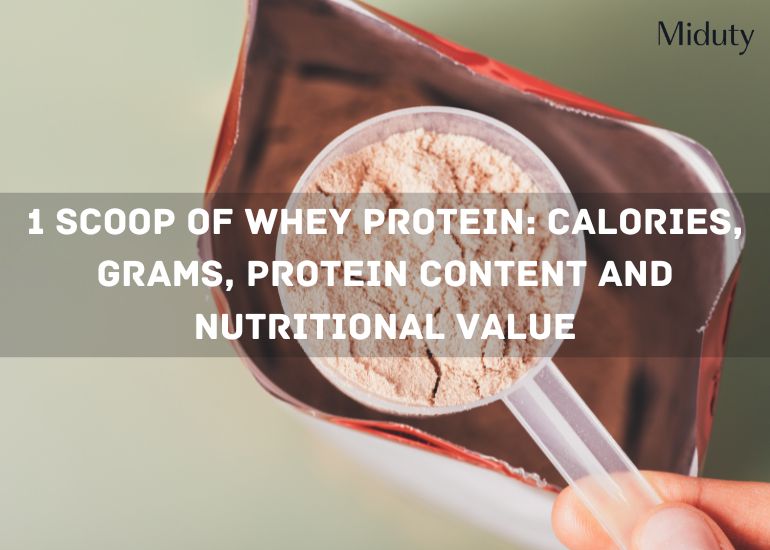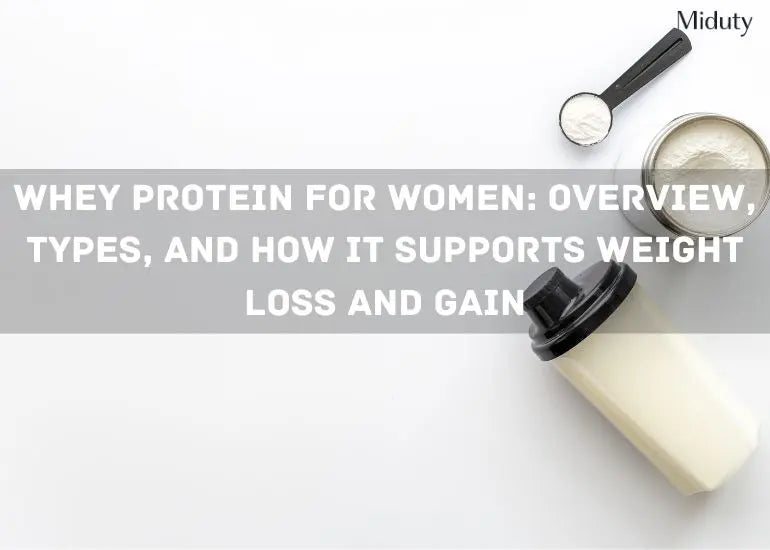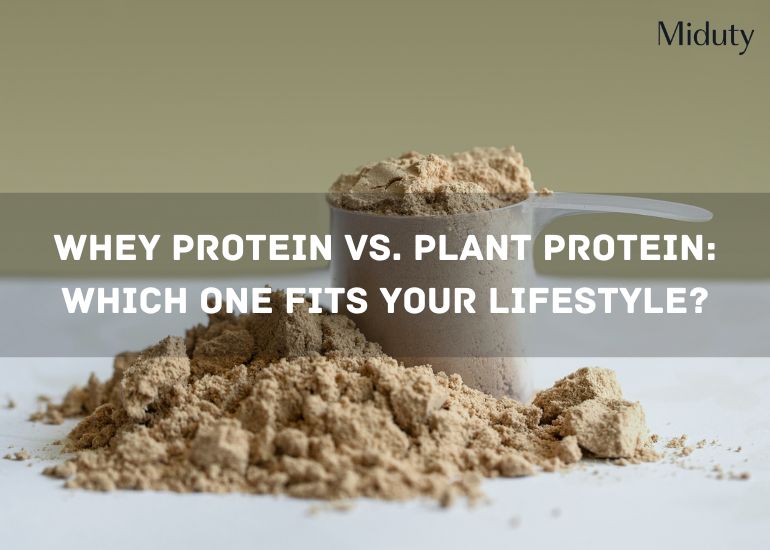
1 Scoop of Whey Protein: Calories, Grams, Protein Content and Nutritional Value
Key Takeaways
1) 1 Scoop Equals 30 Grams: A standard scoop of whey protein typically contains 20 to 30 grams of protein and approximately 110 to 130 calories, depending on the brand.
2) Protein Needs Vary: Daily protein requirements vary based on activity level, ranging from 0.8 grams per kilogram for sedentary individuals to 2.2 grams per kilogram for athletes.
3) Label Reading is Key: It's essential to check the serving size, nutrients per serving, and the percentage of the recommended daily allowance (% RDA) to make informed decisions about your whey protein intake.
4) Supports Health Goals: Whey protein can aid in muscle repair, provide energy, and enhance overall wellness, making it suitable for fitness enthusiasts and everyday use.
5) Not Everyone Needs It: People with a diet rich in meat, fish, dairy, and eggs, and who do not participate in intense weight training likely do not need protein supplements.

Protein isn't just for bodybuilders or gym enthusiasts. It's essential for everyone!
Your immune system relies on it, and so do critical organs like your heart, brain, and skin. Beyond that, protein is known for its ability to curb appetite, support muscle growth, and even help you maintain a healthy weight.
There's a common myth that taking protein supplements can damage your kidneys, and it's something that scares a lot of people away from adding it to their routine.
But here's the truth: for most healthy individuals, protein supplements aren't harmful to the kidneys. This myth likely comes from concerns about excess protein in people with pre-existing kidney conditions, but for the average person, protein supports muscle growth, recovery, and overall health.
So, if you're worried about that protein shake, rest easy—it's not the villain it's made out to be! Just make sure to stay within the recommended amounts and listen to your body.
But how much protein do you really need? That depends on your exercise routine, age, and overall health. While many people meet their daily protein requirements through a balanced diet, others may struggle—especially older adults, athletes, or those following restrictive eating patterns. [1]
This is where protein powders come in. These supplements are made by extracting protein from sources like milk, eggs, peas, rice, or soy. They're often enriched with additional nutrients and formulated to help individuals meet their protein needs conveniently and effectively.
Whether you're looking to enhance muscle growth, support weight loss, or improve overall health, protein powder can be a valuable addition to your routine.
Let's explore everything you need to know about 1 scoop of whey protein, including its benefits, how to choose the right product, and who should consider adding it to their diet.
Table of Contents
2. How Much Protein Does 1 Scoop Provide?
3. How Many Grams are in 1 Scoop of Whey Protein?
4. How Much Whey Protein Do You Need?
5. Nutritional Breakdown of 1 Scoop of Whey Protein
6. Understanding Serving Size and Nutritional Labels
7. Conclusion
9. References
What is Whey Protein?

Whey protein is a high-quality protein derived from milk. During the cheese-making process, milk separates into solid curds and liquid whey. The liquid whey is then processed and dried into a powder form, which becomes whey protein. [2]
Known for its exceptional amino acid profile, whey protein contains all nine essential amino acids that the body cannot produce on its own, making it a complete protein. It's quickly absorbed by the body, making it ideal for post-workout recovery and muscle repair.
Whey protein comes in three different forms:
1) Concentrate: Contains 70-80% protein with small amounts of fat and carbohydrates.
2) Isolate: Contains 90% or more protein with minimal lactose and fat, making it ideal for those with lactose sensitivity.
3) Hydrolysate: Pre-digested protein for faster absorption, often used in medical protein supplements.Its versatility and benefits make whey protein a popular choice for individuals looking to build muscle, lose weight, or supplement their diet. [3]
Also Read: Whey Protein vs. Plant Protein: Which One Fits Your Lifestyle?
How Much Protein Does 1 Scoop of Whey Protein Provide?
A common question is, "How much protein is in 1 scoop of whey protein?"
Most brands provide about 25 grams of protein per scoop, which covers roughly 40-50% of the recommended dietary allowance (RDA) for an average adult. This makes whey protein a convenient and efficient way to meet your daily protein requirements.
The amount of protein in a single scoop of whey protein can differ based on the type of whey and the specific brand or product. Knowing these differences is essential for aligning your intake with your dietary goals. On average:
1) Whey Protein Concentrate (WPC): Delivers around 18-24 grams of protein per scoop. This range exists because WPC retains small amounts of fats and carbohydrates, which slightly reduce the overall protein percentage.
2) Whey Protein Isolate (WPI): Provides a higher concentration, with 25-30 grams of protein per scoop. The removal of most fats and lactose during processing results in a purer protein source, making it an excellent choice for those seeking maximum protein efficiency.
3) Whey Protein Hydrolysate (WPH): Similar to WPI, WPH offers 25-30 grams of protein per scoop. Its pre-digested form allows for rapid absorption, making it especially beneficial for muscle recovery and growth post-workout.How Many Grams are in 1 Scoop of Whey Protein?

Another frequent query is "1 scoop of whey protein in grams." A standard scoop weighs around 30 grams, with most of the weight attributed to protein content, followed by minimal fats and carbohydrates. Always check the product label to confirm the exact serving size of your chosen whey protein.
How Much Whey Protein Do You Need?
The daily protein requirement varies based on factors like age, gender, activity level, and health goals.
- Sedentary Individuals: 0.8 g per kg of body weight
- Active Individuals: 1.2-2.0 g per kg of body weight
- Bodybuilders/Athletes: 1.6-2.2 g per kg of body weight
For most people, consuming 1-2 scoops of whey protein per day (20-50 g) is sufficient to meet their protein requirements.
Also Read: Rice Protein: The Protein Powerhouse You Didn’t Know About
Nutritional Breakdown of 1 Scoop of Whey Protein
The nutritional content of 1 scoop of whey protein can vary slightly depending on the brand. Using Miduty's Fit & Lean Protein Powder as an example, here's a detailed breakdown:
|
Nutritional Component |
Per Serving (30 g) |
Per 100 g |
|
Protein |
15.6 g |
52% |
|
Calories (Energy) |
107.97 kcal |
359.9 kcal |
|
Carbohydrates |
9.3 g |
31 g |
|
Dietary Fiber |
3 g |
- |
|
Probiotic |
1 Billion CFU (Bacillus Coagulans) |
- |
|
Added Sugar |
0 g |
0 g |
|
Vitamin D2 |
240 IU (40% RDA) |
- |
|
Vitamin B12 |
1.8 mcg (81.82% RDA) |
- |
|
Iron |
6 mg (31.58% RDA) |
- |
|
Calcium |
99 mg (9.9% RDA) |
- |
|
Potassium |
153.9 mg (4.4% RDA) |
- |
Miduty's Fit & Lean Protein Powder stands out with added MCTs for sustained energy, 1 billion probiotics per scoop for gut health, and a delicious chocolate flavor, offering more than just protein.
Try Miduty Fit & Lean Protein Powder
Understanding Serving Size and Nutritional Labels
It's essential to read the label carefully to ensure you're getting the desired nutritional value. Below is an explanation using Miduty's Fit & Lean Protein Powder:
|
Label Component |
Explanation |
Miduty Example |
|
Servings per Container |
Total servings in the container |
16 servings per 480 g container |
|
Serving Size |
Amount of product per serving (e.g. in scoops or grams) |
1 scoop OR 30 g |
|
Quantity per Serving |
Nutritional values per serving |
15.6 g protein, 107.97 kcal, 9.3 g carbs, 3 g fiber, 1 Billion CFU probiotic |
|
Quantity per 100 g |
Nutritional values per 100 g of product |
52% protein, 359.9 kcal, 31 g carbs |
|
% RDA |
How much of the daily nutrient needs one serving helps meet (2000 kcal) |
40% Vitamin D2, 81.82% Vitamin B12, 31.58% Iron, 9.9% Calcium |
Conclusion
Whey protein is a powerful, nutrient-dense option for those seeking to improve their health, fitness, or overall diet. It is versatile, convenient, and packed with benefits for muscle growth, weight management, and immune support. Whether you're an athlete, a busy professional, or someone aiming to live a healthier lifestyle, incorporating 1 scoop of whey protein into your daily routine can make a significant difference.
Always choose a high-quality product of protein, and consult a healthcare professional to determine the best serving size for your specific needs.

Frequently Asked Questions on Whey Protein
Q1 - What is the protein content in one scoop?
The amount of protein powder in one scoop can differ based on the brand and type. Typically, a scoop contains about 25 to 30 grams of protein. However, it's important to remember that this amount can vary depending on the specific product and its serving size.
Q2 - Is one scoop of whey protein sufficient?
For a person weighing 75 kg, a daily protein intake should be between 120 and 150 grams. To achieve this, consuming 1 to 2 scoops of whey protein daily is recommended.
Q3 - Is whey protein safe?
Whey protein is generally safe for most adults when taken correctly. However, high doses can lead to side effects such as increased bowel movements, acne, nausea, thirst, bloating, reduced appetite, fatigue, and headaches.
Q4 - Is 2 scoops of whey too much?
The amount of whey protein you need varies based on your diet, activity level, and goals. Typically, 1 to 2 scoops per day is sufficient for most people. It's advisable to consult a registered dietitian for personalized guidance.
Q5 - Can I make whey protein at home?
To begin, place 1 cup (80 grams) of instant, nonfat dry milk into a blender. Next, add 1 cup (80 grams) of either old-fashioned or instant dry oats, followed by 1 cup (142 grams) of almonds. Blend all the ingredients until they form a fine powder. Remember not to add any water to the milk.

References
| Sr. No. | Reference Links |
| 1. | The scoop on protein powder - Harvard Health |
| 2. | Health Benefits of Whey Protein: A Review |
| 3. | (PDF) Whey protein |








